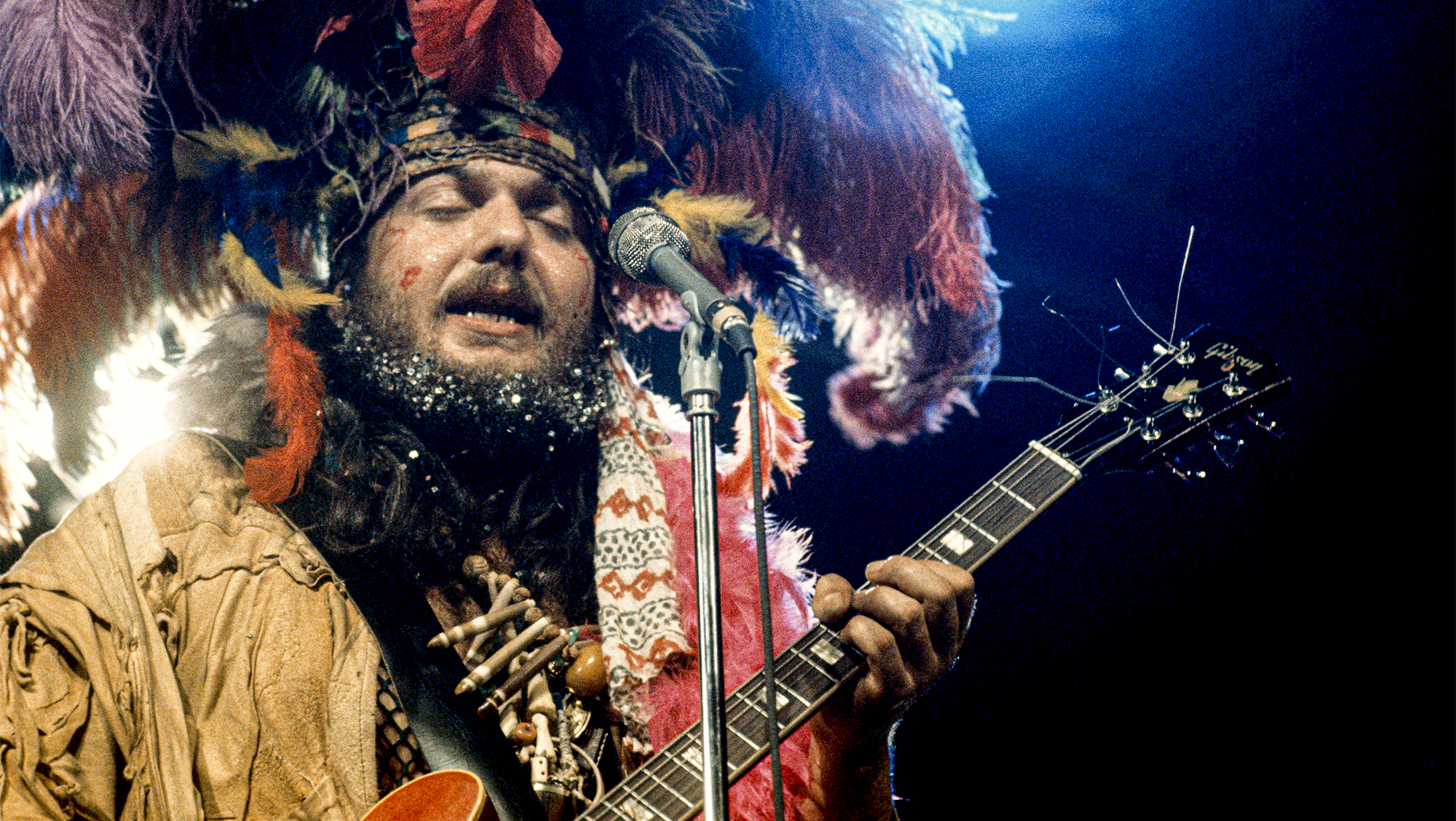Peter Frampton: "I Arrived in San Francisco To Do the Fillmore with Humble Pie. I Had a Terrible Guitar. I Was Almost in Tears Trying to Play it. Lo and Behold, This Young Man Came Up to Me and Said I Could Borrow His Black Les Paul"
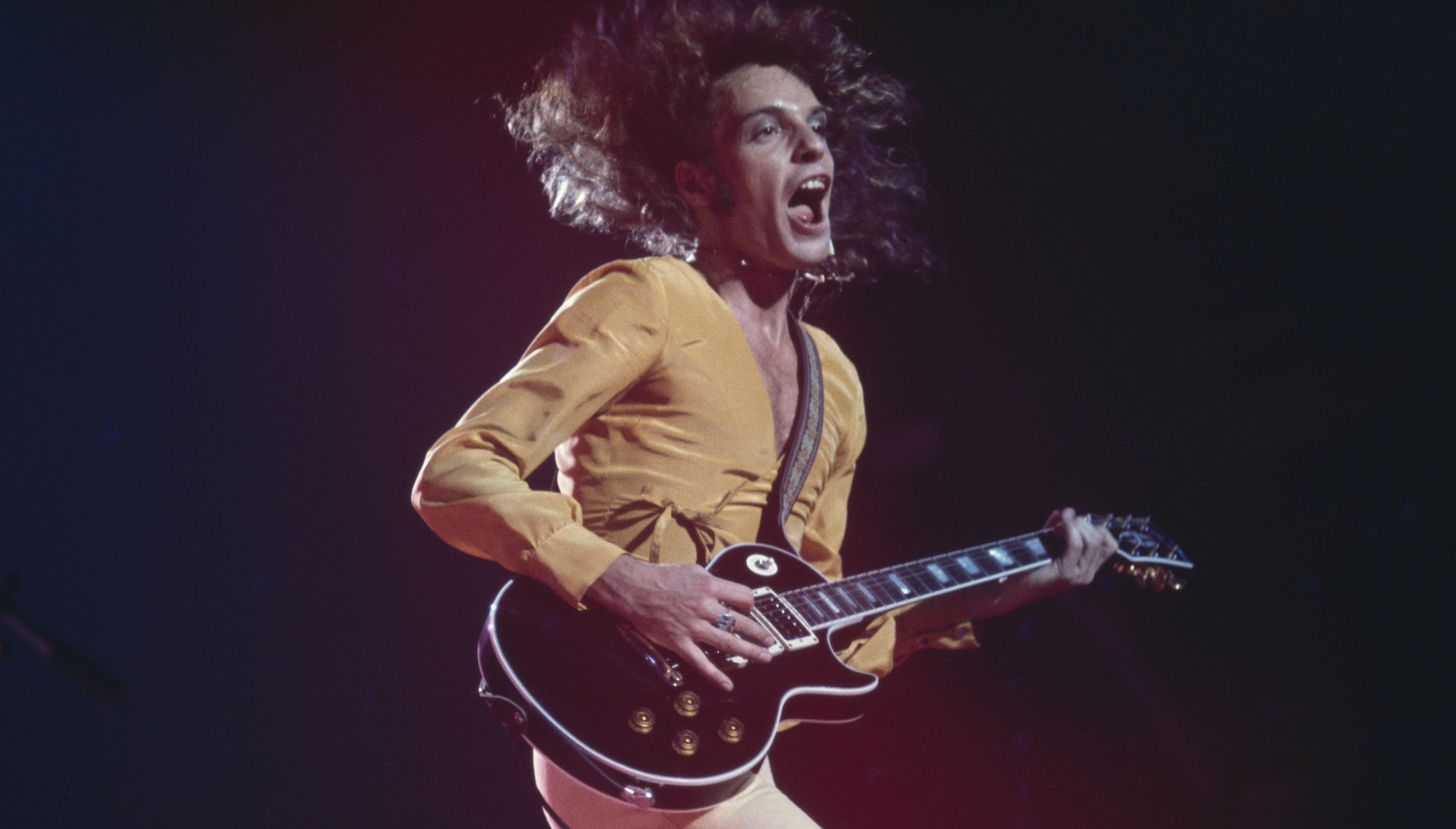
All the latest guitar news, interviews, lessons, reviews, deals and more, direct to your inbox!
You are now subscribed
Your newsletter sign-up was successful
This interview originally appeared in the January 1974 issue of Guitar Player.
Since the age of 12, Peter Frampton, has been performing professionally. At 15, the British guitarist worked clubs such as the Flamingo on London’s Wardour Street, the site of the birth of nearly every major British rock group from the Rolling Stones to John Mayall’s Bluesbreakers. Within a year, Frampton became lead guitarist with the Herd, who produced two Top 10 singles during the time he toured Europe with them, before forming the even more successful Humble Pie with Steve Marriott.
Breaking off on his own in the fall of 1971, Frampton, on his Wind of Change album, proved his musical independence by playing all instruments, and was additionally backed by an impressive lineup of studio and solo stars including Billy Preston, Ringo Starr, and Klaus Voormann. As a session man himself, Frampton has demonstrated his versatility in work with musicians as diverse as Rory Gallagher and Tim Hardin, Albert Lee, and Alvin Lee, not to mention country-western rocker Jerry Lee Lewis.
Progressing from his early jazz and pop influences (ranging from Django Reinhardt and Wes Montgomery to Eddie Cochran and Cream) Peter Frampton has created a style of his own that combines both. His most recent album is Frampton’s Camel, which is also the name of his most recent group.
Do you come from a musical family?
“Yes. My grandmother was very musical. She used to appear playing a ukulele. My grandfather was a choir boy and into keyboards in one of the big abbeys in London. And, at the time of Django Reinhardt, my father played guitar in the college dance band. He showed me the C and G chords on this ukulele I got from my grandmother when I was about seven. That was it for about a year. I didn’t want to learn. But suddenly I wanted him to show me some more chords. So he got it down again.“
When did you finally get your own guitar?
All the latest guitar news, interviews, lessons, reviews, deals and more, direct to your inbox!
“For Christmas, when I was eight. Four pounds ten it was – about 12 dollars. It was from an army and navy surplus store, just an ordinary steel-string guitar – very, very cheap, but really good for the time. I really doctored it and got the action down low. For the following birthday I got a pickup and, with the help of my father, put in a volume and tone control.“
What about your first performance?
“That would have been when I was in the Cub Scouts, and they had a 'gang' show. I appeared solo in that. I did Buddy Holly’s 'Peggy Sue' and a Cliff Richards number. Later, my father produced this end-of-term concert at Bromley Technical High School, where he’s an art teacher. He’s got half the school, everything from photography to typography to pottery to technical drawing to history of architecture. Anyway, he produced this concert, and that was the first time I appeared in a group.
“The raven was the school mascot, and so it was the natural thing to call ourselves the Little Ravens [laughs]. Stupid, really. I used the doctored guitar for that one. I wish I still had it. I sold it so that I could afford my next guitar, a Hofner Club 60 Deluxe shaped like a Les Paul.“
I knew that I was going to end up playing guitar for good... My father used to say, 'Well, yes, and I thought I was going to be a train driver, but you change.' But I haven’t changed. It was the first thing I wanted to be, and here I am doing it
How did you amplify it?
“Through our radio, one of those big old ones which had like a ten-inch speaker. I’ve still got that one, the Hofner. I think I’m going to be using it for steel [bottlenecking]. You’ve got to have a guitar that’s got a high action, so that it doesn’t buzz, and the Hofner has got the high action [laughs]. I’m just getting into steel. I’ve used it on record with Tim Hardin [Painted Head]. It was alien to me, but I really enjoyed it. Ever since then I’ve been trying to improve.“
What sort of slide have you been using?
“Bought metal, but I want to get a real bottleneck. I put it on my third finger, so that I can still chord.“
Are you entirely self-taught?
“I was until my father asked me if I’d like to go to classical guitar when I was nine or ten. I took lessons for four years from Susan Graham in Bromley. The main thing I learned was how to use the little finger on the left hand. It amazes me that more people don’t.“
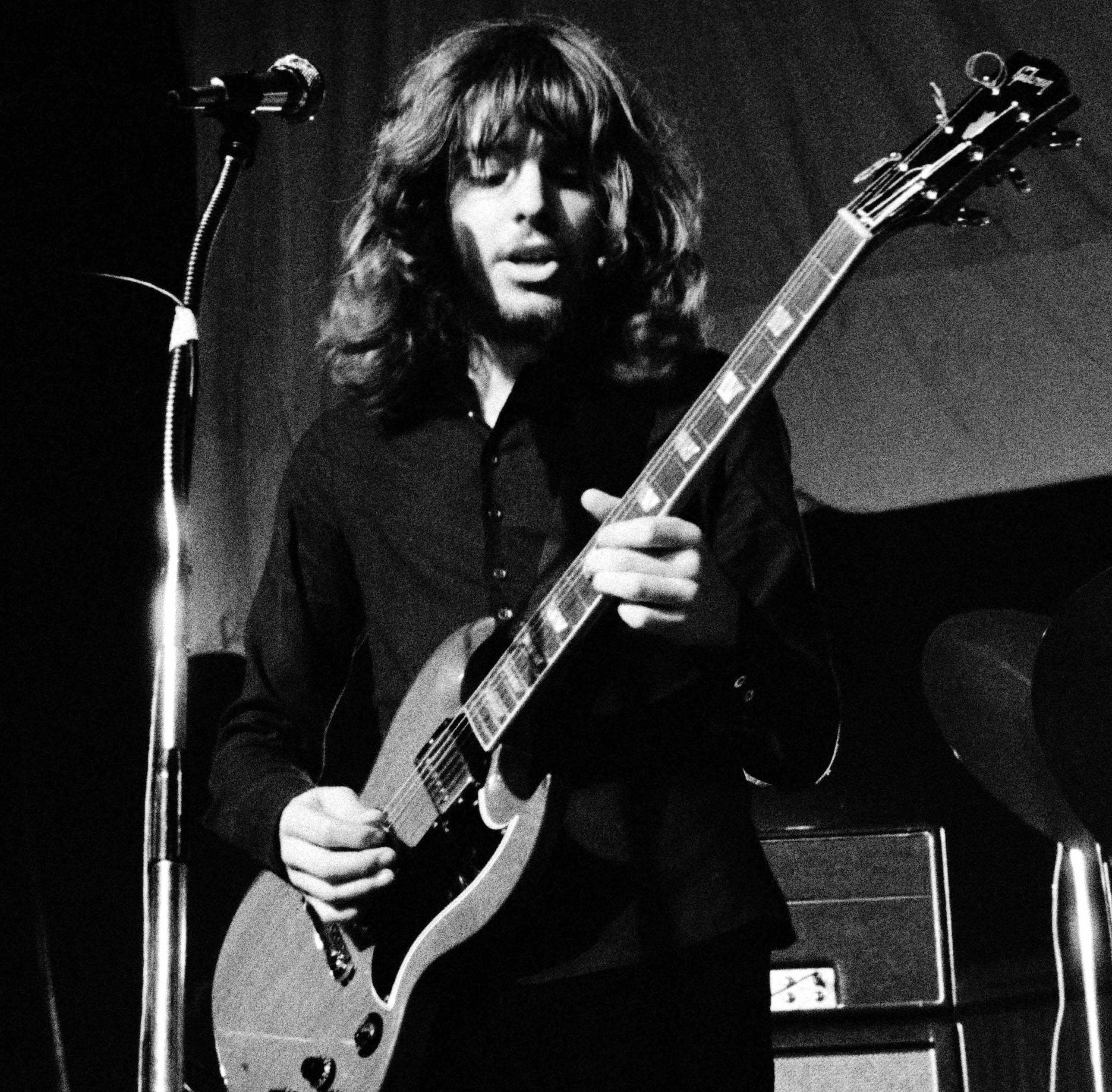
Did you have a love of classical music?
“No, I loathed it. I really loathed it at the time. It was also that I hated discipline of any sort. We’d touch upon a new piece every week. I wouldn’t play it until the night or 20 minutes before I went to the next lesson. Of course, I couldn’t play it very well. I just wasn’t interested. There were too many electric guitars floating about. And that was exciting.“
So why did you stay with the lessons so long?
“It was just that I agreed with my father that I should have them. I knew that I was going to end up playing guitar for good, that it was going to be my life. My father used to say, 'Well, yes, and I thought I was going to be a train driver, but you change.' But I haven’t changed. It was the first thing I wanted to be, and here I am doing it.
“At the time, hardly anybody played guitar. None of my friends did. I was the only person in school who played guitar. I used to take it to school and just sit around the playground and play it. The other fellows knew that when lunch time came that I would get it out. We used to sing all the Beatles’ songs, Buddy Holly songs, things like that.“
Installing pickups and plugging into radios at age nine was pretty sophisticated.
“I’m a gadget maniac. In the early days I used to have two tape recorders. Tape recorders are like second-nature to me. I love fiddling about with anything electronic. My love of gadgets and love of playing guitar went together beautifully.
“I used to play from after school until bedtime, sometimes five or six hours a day. I used to put down a rhythm guitar track first, and then lay down a lead, and then record that as well on another recorder. There was never a, 'I’ll do this to make myself better.' It was just enjoyment of playing, really. I’ve kept quite a few of those tapes. They sound awful.“
Do you practice now?
“Only the practice I get while writing.“
What about bands after The Little Ravens?
“When I was about 12 I formed a group called the Truebeats. And unfortunately I did think of that awful name. We were like a cardboard copy of the Shadows and the Ventures. Later, I got into another group called the Preachers when I was going through my first major influences, and starting to look for a style.
I got really annoyed that Bach was allowed to do it, but I wasn’t. It was frustrating
“I listened to nothing but jazz. I couldn’t listen to any pop records at all. Kenny Burrell and Django Reinhardt are my favorites. Then there’s Wes Montgomery, the funkiest guitarist in the world, he was. George Benson and a little of Joe Pass, but not too much. He was a bit too fast for me. I’ve gone from being narrow-minded and liking only jazz to liking everything. But I wasn’t long with the Preachers, just while I was still at school.“
What were you studying?
“Music. Harmony was the main thing. I think it was sort of to teach you how to be the conductor of an orchestra, really. I’ve not yet had the opportunity or the need for using the theory I learned, because everything is just like a jam, really, these days. You just shout out the chords. Harmony does help when you’re doing backing vocals and learning which chords and what bass lines you can play and when it doesn’t work. But I can tell by ear, anyway.
“The most frustrating thing in being taught the theory of music was the fact that they used to give you a bass line and say, 'Now what we want is a tenor line, an alto line, and a soprano line on top of that.' I’d sit with the guitar or the piano at home, work it out, and think, 'Wow, I’ve got really, really avant-garde harmonies.'
“I would record it, and it would sound great. But when I’d hand it in the following day, the teacher would put a red line through all of it and say, 'The seventh doesn’t descend, it ascends.' Then in the same breath he’d say, 'Bach does this, but Bach is the exception.' I got really annoyed that Bach was allowed to do it, but I wasn’t. It was frustrating.“
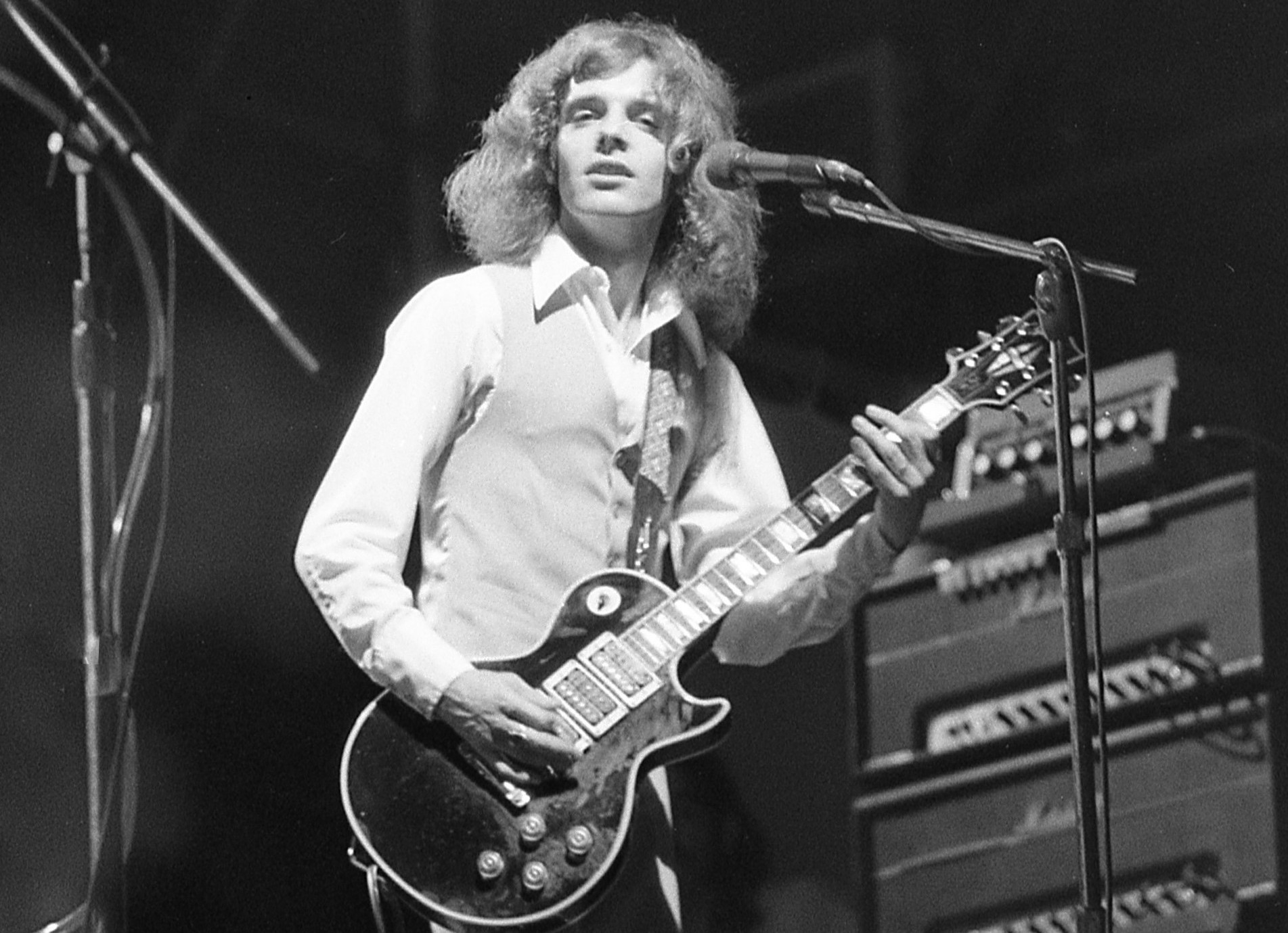
What guitar are you using on stage now?
“About four years ago, I arrived in San Francisco to do the Fillmore with Humble Pie. I had a terrible guitar. I was almost in tears trying to play it. Lo and behold, this young man called Mark Mariana came up to me and said I could borrow his black Les Paul for the next night. Believe it or not, I still have it. It’s my pride and joy, and he gave it to me for nothing. Mark’s a fantastic guy. I really thought things like that only happened to people you read about.
“The guitar has a ’54 body which Mark reworked. He shaved the neck himself. It’s so thin it’s like custom-made. It fits my hand perfectly. He fitted a third pickup on and put white around all three. It looks amazing on stage. I think the latest pickup is 1968. But the others must be very old, because one of them has 'patent pending' written on it, and Gibson has had their patent for years.
The only time that I turn flat-out on the guitar is when I play a solo. With Gibson, especially, the sound of the guitar is at its peak in tone when you’ve got it flat-out
“I don’t think the knobs are original, but they’re around 15 years old. Mark completely rewired it. I think that’s the secret of the sound for me. It’s out of phase. The two outside pickups are wired around the wrong way. It’s wired stereo so that if I had a stereo jack I would have the middle pickup coming through one amp and the outside two coming through another. But I don’t do that because it’s too much hassle.“
Are you using any other guitars now?
“A long-scale Melody Maker and an Ovation 12-string – which I use for recording, but not on stage. I have a Martin acoustic that I got when I left Humble Pie. All I was doing then was sessions, and thanks to Mark, I had the ultimate guitar for sessions. But I was writing a lot. And it’s so much nicer to write on acoustic than electric when you’re not in a band. So I got a D-45. The workmanship on it is just superb. I thought, if Johnny Cash can sling one behind his back on TV, I’ll buy one and play it.
“It’s so beautiful. It has such a full sound and beautiful sustain. It’s perfectly in tune all the way up. It’s the best acoustic I’ve ever played, and it just gets better with age. It had pure white wood when I got it. In about 18 months it’ll be bright yellow. The sunlight just improves it. The wood gets more and more seasoned.
“When we have time enough to do our whole show, I’ll be doing acoustic numbers on stage again, and then I shall use my Martin. The action is very close for an acoustic, but it doesn’t buzz. On the Les Paul it’s incredibly close, too, but the pickups won’t pick up the buzz.“
What sort of strings do you put on?
“In the jazz days I used flatwound, but now I always use wire-wound. Picato ultra-light gauge, round wire-wound. They come from Wales. On the Martin I use D’Angelico. If I’m recording, I always change the strings for every track. Performing, I use them for two shows.“
What set-up are you using on stage?
“I use Marshall amps, two 100-watt amps through three 4x12 cabinets. So one amp uses one speaker, and one amp uses two speakers. I have one speaker on Mick’s [Gallagher, keyboards] side, and a monitor so the others can hear me. I have two speakers on my side and two amps, and they have one cabinet their side. They’re both half up. The only time that I turn flat-out on the guitar is when I play a solo. With Gibson, especially, the sound of the guitar is at its peak in tone when you’ve got it flat-out. When you turn it anywhere down from full volume the tone goes bassier.
“I think it’s cheating to use fuzz, but I use wah-wah for tone control. For recording, I use a Uni-Vibe, but they break up on stage. Then I use the Binson Echorec. I don’t use it that much for recording, because we have so many echo facilities in the studio of such high quality that there’s no point. But on stage I do like echo for a solo to lift it just that bit more.
“Recording, I very rarely use big amps. There’s no point in playing at volume in studios. I usually use very small amps, one of them being the Fender Champ, the smallest amp they make. You can turn it flat-out and talk above it, and it sounds like a Marshall 100-watt. That’s why I like it.“
What sort of pick do you use?
“I use a Hofner. It’s very small and very thick, and it doesn’t bang at all. I hold it with my thumb and first finger just so the point sticks out. I use a new one each night. Mostly I pick with down strokes except when I go fast, then it’s up and down. Actually, I don’t give it much thought.“
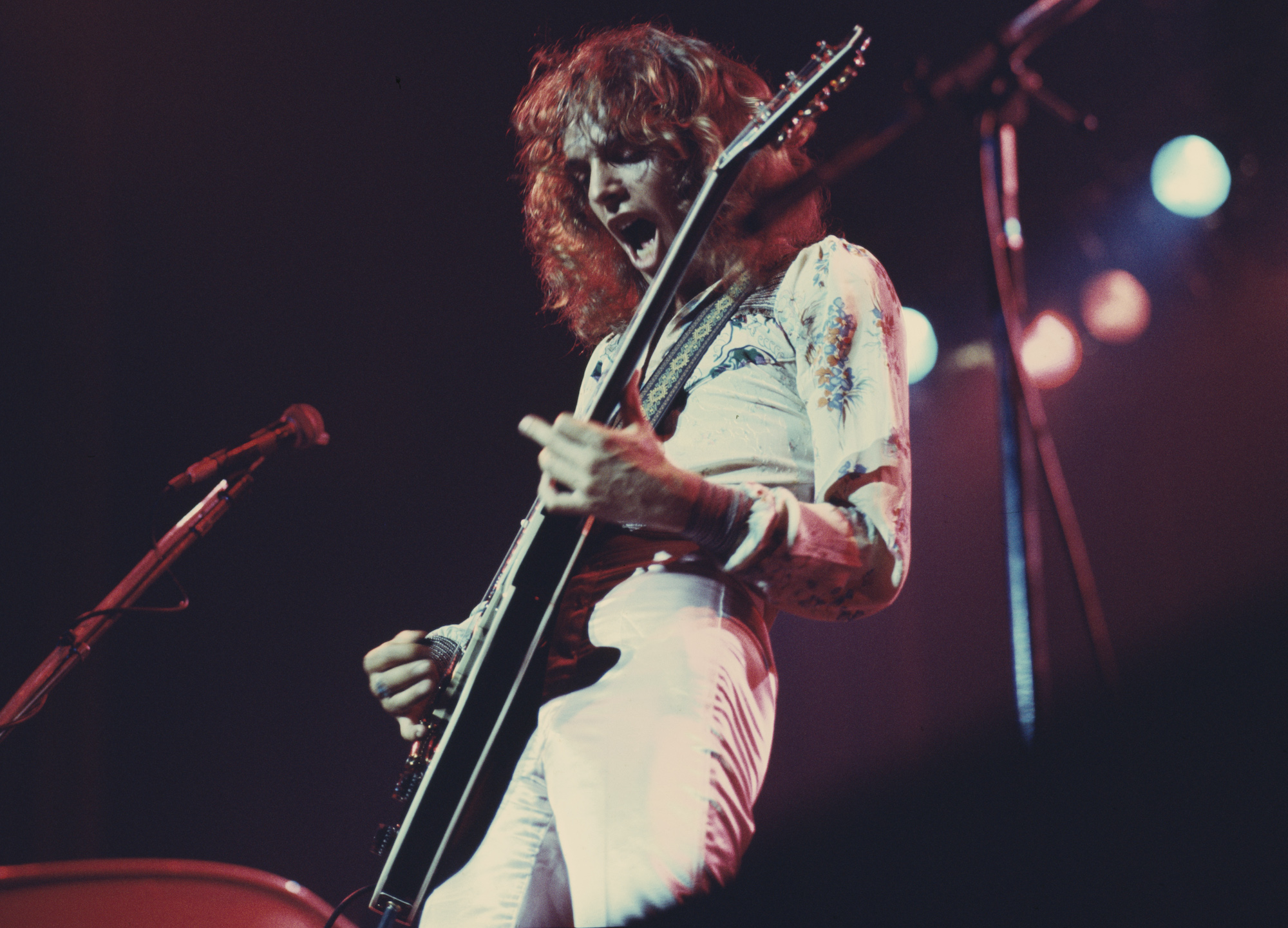
What about your left-hand technique?
“It’s mainly a mixture of hammers and snaps [pull-offs] and full barres. I’m a great believer in jazz chords. I use as many as possible – 13ths, 9ths, suspended. The solos are improvised. Mostly I get the leads off the chords.“
Do you use other tunings?
“On the Wind of Change album I used the standard D tuning. I also use a C tuning which goes E, C, G, E, C, C, and a G tuning that is G, B, D, G, B, D.“
Any advice for people just starting out?
“Don’t give up. Sometimes I still feel like it when I see someone who is really good, like Leo Kottke. I’m a great fan of his. But Kottke once said to me, 'Give me your plectrum; if only I could use a plectrum.' You see, there are so many styles. I know there will always be people better than me. But then again, no one will ever play like me or like Clapton or like Django. We are all different.“
What do you think you’ll be doing ten years from now?
“I don’t think about it. But now I’m getting into keyboards more than I have ever done before. All I’m working for at the moment is enough money to be able to waste on my own studio. That’s really what I want. One of my ambitions is to write a complete score and hand it to an orchestra. I’d love to write a film score one day. Write everything and conduct the orchestra as well. But performing is the best thing for a musician. It keeps you from becoming stagnant. I’ll never be able to stop working on the road, I’m sure. Let’s face it, I’m a showoff.“
